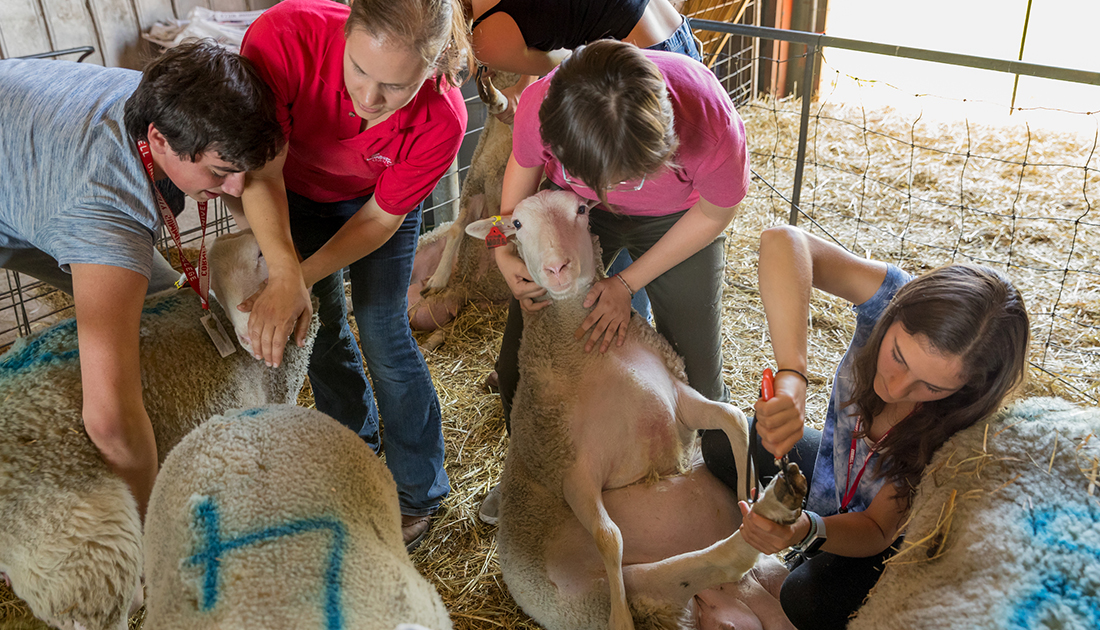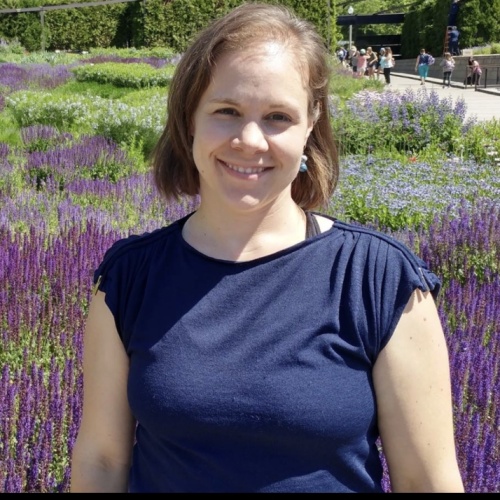ANSC 1120 Sustainable Animal Husbandry

Course description
Students completing this course will explore the many roles of domestic animals and the importance of their interdependence with humans; appreciate the scope, diversity, and problems related to domestic animal systems; practice using scientific literature to research issues in sustainable agriculture. This intensive course includes 25 hours of lecture and 27 hours of hands-on laboratory/ demonstrations at various field sites and facilities all within a three-week period. Topics include domestication, sustainability, companion animals, sheep, goats, swine, beef cattle, dairy cattle, nutrition, genetics, grazing, dairy products, poultry, horses and draft animals, Third World limited-resource animal systems, toxicology and lab animals.
Outcome 1: Compare and contrast various domestic animal production systems.
Outcome 2: Apply basic knowledge of animal nutrition, genetics, reproduction, and physiology to domestic animal species.
Outcome 3: Research and critique various perspectives of issues related to sustainable domestic animal production systems using scientific journal articles.
Outcome 4: Produce a researched outline and debate an agricultural issue of interest in sustainable agriculture.
Outcome 5: Exchange scientific ideas with classmates.
Outcome 6: Synthesize a viewpoint on an issue in sustainable agriculture based on research and discussion.
This course is an elective and not required for Animal Science majors.
No upcoming classes were found.
Previously offered classes
Winter 2025: Online course

| Section ID: | ANSC 1120 001-LEC |
| Number: | 1101 |
| Session: | 3-week Winter session |
| Class dates: | January 2-18, 2025 |
| Mode of instruction: | Online (async) |
| Final exam/project due: | Saturday January 18, 11:59 PM (see Final exams) |
| Credit: | 3 |
| Instructor: | Soberon, M. (mas329) |
| Related: | ANSC 1120 401-LAB |
| To enroll: |
See Online Learning FAQs. This course is open to all registrants, including undergraduates and precollege students. |
Winter 2025: Online course

| Section ID: | ANSC 1120 401-LAB |
| Number: | 1102 |
| Session: | 3-week Winter session |
| Class dates: | January 2-18, 2025 |
| Mode of instruction: | Online (async) |
| Final exam/project due: | Friday January 17, 11:59 PM (see Final exams) |
| Credit: | 0 |
| Grade: | Student option |
| Instructor: | Soberon, M. (mas329) |
| Max. enroll: | 30 |
| Related: | You will be auto-enrolled in ANSC 1120 001-LEC |
| To enroll: | Register now
See Online Learning FAQs. This course is open to all registrants, including undergraduates and precollege students. |
Summer 2025: Online course

| Section ID: | ANSC 1120 002-LEC |
| Number: | 1362 |
| Session: | Summer 3-week 1 |
| Class dates: | June 2-20, 2025 |
| Mode of instruction: | Online (async+sync) |
| Days / times: | W 5 PM - 7 PM |
| Final exam/project due: | Friday June 20, 11:59 PM (see Final exams) |
| Credit: | 3 |
| Grade: | Student option |
| Instructor: | Soberon, M. (mas329) |
| Max. enroll: | 30 |
| Notes: | This is mostly an asynchronous distance learning course with three required synchronous sessions on June 4, 11, and 18 from 5:00-7:00pm EST. |
| To enroll: | Register now
See Online Learning FAQs. This course is open to all registrants, including undergraduates and precollege students. |
Summer 2025: Ithaca campus

| Section ID: | ANSC 1120 001-LEC |
| Number: | 1360 |
| Session: | Summer 3-week 2 |
| Class dates: | June 23-July 11, 2025 |
| Mode of instruction: | In person |
| Days / times: | M-F 9:30 AM - 11:30 AM |
| Location: | See the University Roster for class locations. NetID required. |
| Final exam/project due: | Friday July 11, 9:30 AM - 11:30 AM (see Final exams) |
| Credit: | 3 |
| Instructor: | Soberon, M. (mas329) |
| Related: | ANSC 1120 401-LAB |
| To enroll: |
This course is open to all registrants, including undergraduates and precollege students. |
Summer 2025: Ithaca campus

| Section ID: | ANSC 1120 401-LAB |
| Number: | 1361 |
| Session: | Summer 3-week 2 |
| Class dates: | June 23-July 11, 2025 |
| Mode of instruction: | In person |
| Days / times: | TR 1 PM - 4 PM |
| Location: | See the University Roster for class locations. NetID required. |
| Final exam/project due: | (see Final exams) |
| Credit: | 0 |
| Grade: | Student option |
| Instructor: | Soberon, M. (mas329) |
| Max. enroll: | 35 |
| Related: | You will be auto-enrolled in ANSC 1120 001-LEC |
| To enroll: | Register now
This course is open to all registrants, including undergraduates and precollege students. |

Cornell Chronicle, 2022


